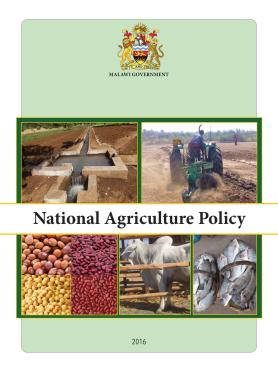National Agriculture Policy 2016
National Agriculture Policy 2016
The National Agriculture Policy (NAP) defines the vision for development of the agricultural sector in Malawi over the next five years. By 2020, agriculture in Malawi will increasingly be oriented towards profitable commercial farming through specialization of smallholder farm production, output diversification at the national level, and value addition in downstream value chains. The NAP will guide the design of agricultural subsector policies, strategies, and other actions of the Government of Malawi over the next five years. This will ensure sustainable agricultural production, increased mechanisation, increased area under irrigation, increased agroprocessing and value addition, enhanced risk management, strengthened marketing systems, accelerated export growth, and improved food security and nutrition.
The emphasis of this policy is on achieving farmer-led agricultural transformation and commercialization that entails treating farming as a business. The policy will facilitate and harness dynamic transitions taking place within farming communities, in particular the movement of farming households into non-traditional high-value agricultural value chains and increased engagement in profitable off-farm and non-agricultural livelihoods. Through the implementation of the NAP, the government of Malawi intends to create a conducive environment for sustained growth in the agricultural sector. The NAP seeks to transform the motivation for engagement in agricultural production by Malawian farmers from simply being the primary means by which they secure their basic livelihood. Rather, by engaging more in commercialized agriculture, wealth creation becomes the motivation. Therefore agriculture, as a business, will increasingly serve as a springboard to a better life for Malawi’s farming families, providing children in those households with a much broader set of economic opportunities and career choices than their parents had.

